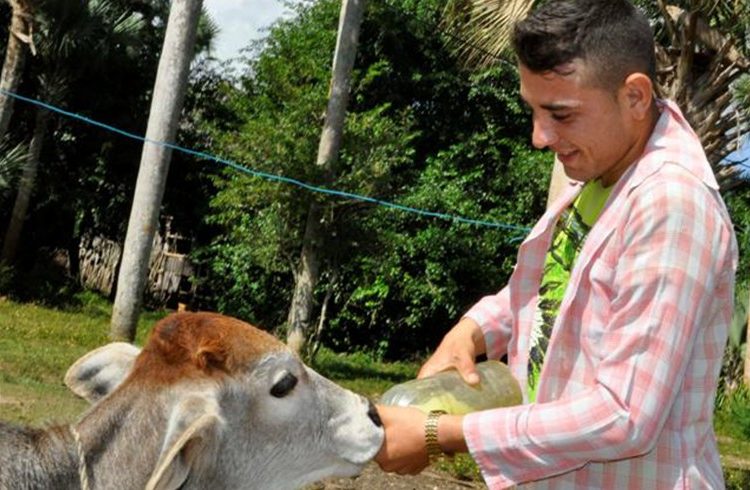The day Axel Luis Sardinas Hernández was going to die, his grandfather Tomás Hernández clenched his fists and throat, took a deep breath and said no, that life had already taken a son from him and that it wouldn’t take this one. The boy was two weeks in and out of an operating room, reported serious and that afternoon the news was shorter: nothing else was to be expected.
The cool March wind rattled the palm leaves roof of the house and the old man looked to the ground with a sharp look, like a new plow. Nearly 30 years ago malaria, in Angola, had left him without his José Luis and now a whimsical peritonitis again put in his body the unbearable pain of loss. He repeated the tiny word, its definition of hope (or certainty), and went to see those pumpkins growing on the black floor with which the boy of his affections wanted to buy a motorbike. Axel was going to die that March 2, but Doctor Luisito also said no.
To get in or out of La Julia, a nook in the geography of Majagua, in Ciego de Ávila, there is only one path with multiple entries. A narrow road winds battered the intricacies of marabou and tomato fields. It can be accessed by Jicotea, Lazaro Lopez, Mamonal or through the back, as if coming from Marroquí and goes, first, by the ancient stone mill of Las Grullas. But we got to Campo Hatuey led by Ignacio, a grandfather of 87 years that knows the area with his eyes closed. A bus makes its way at the wrong time and in the long intervals people arrive and go thanks to a “riquimbili” that lacks a license to transport persons, or on foot.
That night, at about 11:00, Axel Luis felt a strong pain, cramping on one side that forced him to be bent over his body and his grandmother Albertina saw him, his face sweaty she knew the thing was serious. At that time the only thing that could come out of La Julia was the truck of the cooperative and the father of the 14 year old boy, who was the president of the cooperative, did not think twice. He mounted the boy and went straight for the Provincial Hospital. Upon arrival, the doctors on duty couldn’t agree, should be appendicitis, but they preferred to wait until morning.

At 8:00, punctual, Dr. Luisito arrived and while indicating the steps he did some tongue-lashing because they had to have called him at home. In radiography a confusing image was observed and the order was to prepare urgently the boy to enter the room. “Close your eyes and swallow saliva, you’re going to fall asleep,” was the last thing Axel Luis heard before the anesthesia took effect. The infection had progressed enough and the face the physician should reflect his concern.
In the 21 days he was in the intensive care unit, Axel came and went six times through the operating room. When he was conscious he didn’t cry, but must be done continuously, the only question you never want to know the answer: “I’m going to die?”
His mom went out at times to breathe, but did not leave him alone at any time. The hallways were filled with classmates, neighbors, family and the silence became dull murmur, like prayer and supplication. To his father, the doctor surprised more than once on the stairs, overcome by the circumstances, his eyes flooded as a rice field.
“Luisito always had faith,” says Albertina. “He did not give false hope, telling us that he preferred that progress was slow.” An improvement, suddenly, could be the threshold of the final. Grandma makes an effort not to mourn, now that it has been almost three years, she still gets a dry mouth, saliva is choking, and confesses that she expected the worst, because “before that, nobody escaped that “.
“Here they tell me that went up and down,” says Axel and his twinkling eyes shine as he talks to the cadence of the peasants going to be too hard to find in the fields. He is 17 years old and had to give battle to the death like a man, like his uncle in Angola, which was also just a boy. And one thinks, like the poet, there are blows in life, so strong, like the hatred of God.
In La Julia everybody knows who the guy who almost died is. Recovery was slow, because neither can tempt fate too. Axel says that both antibiotic, even one who had to go look in Villa Clara, nor cold gives renewed health and enjoy that working the land with his grandfather, planting beans and tomato. He will finish twelfth grade to avoid being a brute, but really, what he likes most is the smell of damp earth, the trot of his sorrel, the calf raised as a pet and bustle at harvest.
The grandfather looked after the pumpkin crop, and with the monies resulting from the sale, bought the motorbike for the boy, which the girls in town want to ride in. After that, they never got pumpkins, perhaps because the day Axel was to die, the grandpa said no and stroke a deal with the crop, to exchange the boy´s fate with the vegetables.










